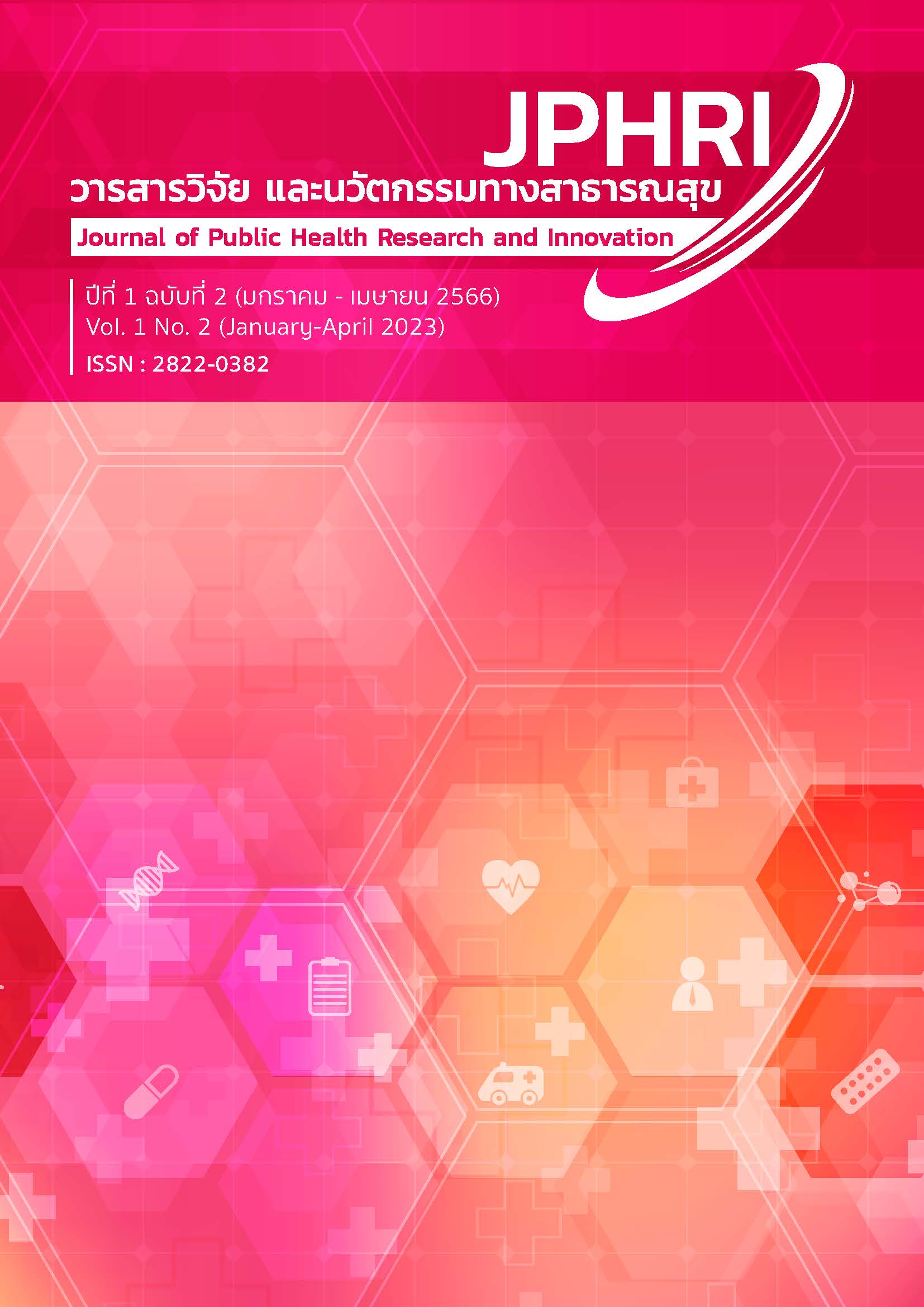ผลของโปรแกรมการจัดการตนเองต่อพฤติกรรมการควบคุมความดันโลหิตและ ระดับความดันโลหิตในผู้ป่วยโรคความดันโลหิตสูงที่ควบคุมความดันไม่ได้ โรงพยาบาลทุ่งใหญ่ จังหวัดนครศรีธรรมราช
Main Article Content
บทคัดย่อ
บทนำ: โรคความดันโลหิตสูงที่ควบคุมไม่ได้ส่งผลให้เกิดภาวะแทรกซ้อน วิธีควบคุมความดันโลหิตของผู้ป่วยให้อยู่ในเกณฑ์เป้าหมายต้องใช้วิธีการที่เหมาะสม โปรแกรมการจัดการตนเองจะช่วยให้ผู้ป่วยมีความรู้และทักษะในการควบคุมระดับความดันโลหิต และสามารถป้องกันภาวะแทรกซ้อนได้
วิธีการศึกษา: วิจัยกึ่งทดลอง (quasi-experimental research) แบบสองกลุ่มวัดผลก่อนและหลังการทดลอง (two group pretest-posttest designs) กลุ่มทดลองจำนวน 32 คน ได้รับโปรแกรมการจัดการตนเองเป็นเวลา 8 สัปดาห์ กลุ่มควบคุมจำนวน 32 คน ได้รับการดูแลตามแนวทางปกติ เก็บรวมรวมข้อมูลด้วยแบบสัมภาษณ์ประกอบด้วย 2 ส่วนได้แก่ 1) ข้อมูลคุณลักษณะส่วนบุคคล และ 2) ข้อมูลพฤติกรรมการจัดการตนเอง วิเคราะห์ข้อมูลโดยใช้สถิติเชิงพรรณนา และเชิงอนุมาน ได้แก่ chi-square test, Paired t test และ Independent t test
ผลการศึกษา: กลุ่มทดลองมีค่าเฉลี่ยคะแนนพฤติกรรมการควบคุมความดันโลหิตสูงกว่ากลุ่มควบคุมทุกด้าน ได้แก่ ด้านการรับประทานอาหาร, ด้านการออกกำลังกาย, ด้านการจัดการความเครียด, ด้านการรับประทานยา, ด้านการมาตามนัด และด้านการควบคุมปัจจัยเสี่ยง แตกต่างอย่างมีนัยสำคัญทางสถิติ (p<.05) และเมื่อเปรียบเทียบค่าเฉลี่ยความดันโลหิตระหว่างกลุ่มทดลองและกลุ่มควบคุม พบว่ากลุ่มทดลองมีค่าเฉลี่ย Systolic BP เท่ากับ 134.72 (SD= 8.43) น้อยกว่ากลุ่มควบคุมที่มีค่าเฉลี่ย 153.69 (SD= 15.45) แตกต่างกัน 18.97 มิลลิเมตรปรอท และค่าเฉลี่ย Diastolic BP ของกลุ่มทดลองเท่ากับ 80.63 (SD= 8.43) น้อยกว่ากลุ่มควบคุมที่มีค่าเฉลี่ย 89.63 (SD= 6.69) แตกต่างกัน 9 มิลลิเมตรปรอท แตกต่างอย่างมีนัยสำคัญทางสถิติ (p<.05)
สรุปผล: โปรแกรมมีประสิทธิภาพต่อการแก้ปัญหาผู้ป่วยโรคความดันโลหิตสูงที่ควบคุมระดับความดันไม่ได้ และสามารถใช้เป็นแนวปฏิบัติในการทำงานเพื่อแก้ปัญหาผู้ป่วยในคลินิกโรคความดันโลหิตสูง สามารถลดอัตราการเกิดภาวะแทรกซ้อนจากโรคความดันโลหิตสูงได้
Article Details

อนุญาตภายใต้เงื่อนไข Creative Commons Attribution-NonCommercial-NoDerivatives 4.0 International License.
เอกสารอ้างอิง
Indicators Report, Ministry of Public Health, Bureau of Policy and Strategy, Ministry of Public Health. (2022). Retrieved October 1, 2022 from https:// hdcservice. moph.go.th/hdc/reports/report.phps o u r c e = p f o r m a t e d / f o r m a t 2 . p h p & c a t _ id=491672679818600345dc1833920051b2&id=87af- 734bc7575ecba528b7c9dba063bb.
World Health Organization 2019. Noncommunicable Diseases. Retrieved September 7, 2022. form: https://www.who.int/data/gho/data/themes/topics /noncommunicable-diseases.
Aekplakorn, W. (editor). Thai national health examination survey VI study group. Nonthaburi: Aksorn Graphic and Design; 2021.
Thai Hypertension Society. 2019 Thai guidelines on the treatment of hypertension. Chiang Mai: Trick Think; 2019.
Kanfer, FH., Gaelik-Buys L. Self-management methods. En: Kanfer FH, Goldstein AP, comp. Helping people change. Nueva York: Pergamon Press, 1991: 305-360.
Promsila, W., Neawbood, S., Rithpho, P. Effects of hypertension prevention program on practical behaviors and blood pressure levels among high risk of hypertensive persons. Nursing Journal. 2019; 46(2): 95-107.
Cohen, J. Statistical power analysis for the behavioral sciences. Routledge. 2013.
Oupachai, S., Jenjaiwit, S. The effect of family health promotion program on health behavior among cataract surgery patients and families. Research and Development Health System Journal.; 15(2): 16-30.
Sittiwang, S., Aungwattana, S., Tamdee, D. Effect of self-management promoting program on health behaviors and blood pressure level of person with uncontrolled hypertension. Nursing Journal. 2020; 47(2): 85-97.
Wangtapan, K. Stroke prevention self-management program in patients with uncontrolled hypertension. Huachiew Chalermprakiet University. 2019.
Chansree, N., Nateetanasombut, K., Kasiphol, T. Effect of self-management promoting program among uncontrolled hypertensive patients. Huachiew Chalermprakiet Science and Technology Journal. 2020; 6(2): 58-68.
Zha, P, Qureshi R, Sickora, C, Porter, S, Chase S, Chao YY. Development of a patient-nurse trust scale in under-served community setting. J Community Health Nurs 2020; 37:9-18.
Kotta, K., Natason A., Kaewkerd O. De. Development of the Food Consumption Behaviors Modification Model Basedon Lifestyle to Prevent Non-Communicable Diseases Among Adults with Overweight and Obesity. Regional Health Promotion Center 9 Journal. 2022; 16(3): 799-815.
Julawono, N. Effects of an Individual education program on self- care behavior among patients with tuberculosis. The Southern College Networe Journal of Nursing and Public Health. 2016; 3(1): 17-30.
Trinnawootipong, K., Rachagrai, T., Tumala, P., Nasa-arn, S. Effect of a salty reduction program in the suspected hypertensive patients in health area 7. The office of disease prevention and control 9 Nakhon Ratchasima Journal. 2021; 27(3): 43-52.
Seephom S, Prapaipanich W, Janepanich P, Pichaiwong W. The effect of self – management program for slow chronic kidney disease progression on knowledge, health behavior and blood pressure levels. Thai Journal of Cardio-Thoracic Nursing. 2014; 25(1): 16-31.
White, D. W., & Raven, P. B. (2014). Autonomic neural control of heart rate during dynamic exercise: revisited. The Journal of physiology, 592(12), 2491–2500.
White, D. W., & Fernhall, B. Effects of Exercise on Blood Pressure and Autonomic Function and Other Hemodynamic Regulatory Factors. In L.S. (2015).
White, D. W., & Fernhall, B. (2015). Effects of Exercise on Blood Pressure and Autonomic Function and Other Hemodynamic Regulatory Factors. Effects of Exercise on Hypertension: From Cells to Physiological Systems. 2015: 203-225.
Boonngam, L., Toonsiri, C., Junprasert, S. Effects of the qigong exercise program on blood pressure levels among prehypertensive women in Meuang District, Sing Buri Province. The Journal of Faculty of Nursing Burapha University, 2017; 25(1): 82-94.
Autorn N, Wangrath J, Boonchieng W. The effect of basic drug use handbook for patients with uncontrollable hypertension. LPHL. 2020; 16(2): 81-91.
Hypertension Association of Thailand, 2019 Available form: http://www.thaihypertension.org/information. html Accessed on date 7 Sep 2022.
Charoenwongsa, K., Wirojratana, v., Wattanakitkrileart, D. The Effect of a Medication Adherence Promotion Program through the Line Application on Older Persons with Essential Hypertension. Nursing Journal CMU. 2022; 49(2); 313-325.


